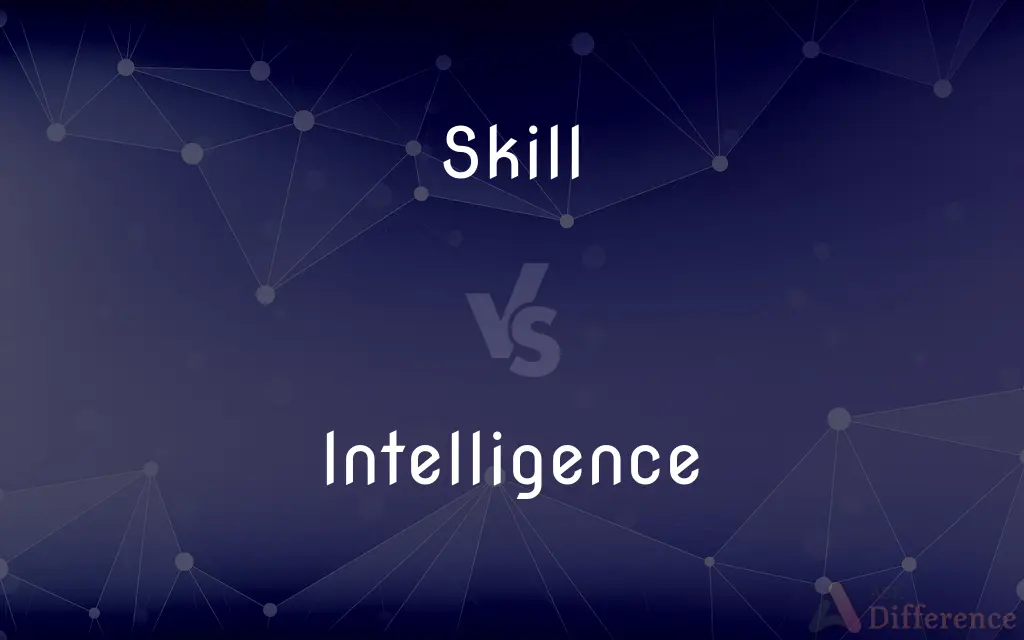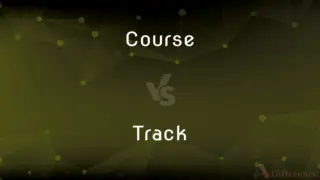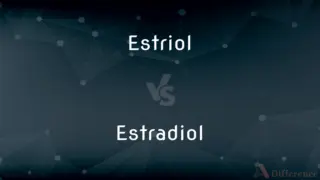Skill vs. Intelligence — What's the Difference?
By Tayyaba Rehman — Updated on November 2, 2023
Skill is the ability to do something well, intelligence is the capacity to learn, understand, and reason.

Difference Between Skill and Intelligence
Table of Contents
ADVERTISEMENT
Key Differences
Skill refers to the expertise or proficiency that is acquired or developed through training or experience. It is often specific to certain tasks or activities, such as playing an instrument, coding software, or cooking. Skills are measurable through performance and can be taught and enhanced over time through practice.
Intelligence, on the other hand, is the inherent ability to understand complex ideas, adapt effectively to the environment, engage in various forms of reasoning, and learn from experience. It is broader than skill, encompassing cognitive abilities such as memory, problem-solving, and abstract thinking. Intelligence is often considered innate to some degree and can be reflected in a wide range of adaptive behaviors in different environments.
Skills are generally applied to concrete tasks and are often visible in the execution of a particular activity. For instance, a skilled carpenter deftly shapes wood into furniture, showcasing their mastery through the end product. Intelligence manifests in understanding the principles behind carpentry, such as geometry and design, which can then be applied to learning and developing carpentry skills.
A skill can be seen as a tool that intelligence uses to interact with the world effectively. Someone with linguistic intelligence might learn languages more swiftly, but the skill lies in actually speaking and writing in a new language. The development of skills often requires a baseline of intelligence, but having a high intelligence doesn't necessarily mean having a high level of skill without practice.
While skill is often domain-specific, intelligence is domain-general. This means that skills are usually confined to specific areas of activity, whereas intelligence spans across different domains, potentially influencing the ability to gain various skills. For example, a person might have the skill to solve mathematical problems quickly but may or may not have the overall intelligence to understand the broader applications of mathematics in real-world scenarios.
ADVERTISEMENT
Comparison Chart
Definition
The ability to perform tasks with expertise.
The ability to acquire knowledge and reason.
Nature
Acquired through practice and experience.
Considered innate and developed.
Measurement
Assessed through performance in specific tasks.
Assessed through cognitive tests and reasoning.
Application
Task-specific abilities.
General cognitive abilities.
Development
Enhanced by repetition and training.
May be developed but largely seen as innate.
Compare with Definitions
Skill
Proficiency acquired through training.
Her skill at playing violin impressed everyone.
Intelligence
The ability to acquire and apply knowledge and skills.
Her intelligence was evident from her quick learning.
Skill
A skill is the learned ability to perform an action with determined results with good execution often within a given amount of time, energy, or both. Skills can often be divided into domain-general and domain-specific skills.
Intelligence
The collection of information of military or political value.
The agency gathers intelligence from around the world.
Skill
Expertise in a particular technique or technology.
Her computer programming skills landed her a job at a tech firm.
Intelligence
Mental acuity or quickness.
He solved the puzzle with impressive intelligence.
Skill
A developed talent or ability.
Cooking is one skill I wish to master.
Intelligence
Intelligence has been defined in many ways: the capacity for logic, understanding, self-awareness, learning, emotional knowledge, reasoning, planning, creativity, critical thinking, and problem-solving. More generally, it can be described as the ability to perceive or infer information, and to retain it as knowledge to be applied towards adaptive behaviors within an environment or context.
Skill
A developed talent or ability
Improved his writing skills.
Intelligence
Innate cognitive function.
Emotional intelligence is key to social interaction.
Skill
An ability to do something well.
He honed his skill in negotiation over years in sales.
Intelligence
The ability to acquire, understand, and use knowledge
A person of extraordinary intelligence.
Skill
Dexterity or coordination in performing tasks.
His skill with a paintbrush is remarkable.
Intelligence
The understanding and reasoning capability.
Artificial intelligence mimics human thought processes.
Skill
Proficiency, facility, or dexterity that is acquired or developed through training or experience
Painted with great skill.
Intelligence
Information, especially secret information gathered about an actual or potential enemy or adversary.
Skill
An art, trade, or technique, particularly one requiring use of the hands or body
The skill of glassmaking.
Intelligence
The gathering of such information
"Corporate intelligence relies on a slew of tools, some sophisticated, many quite basic" (Neil King and Jess Bravin).
Skill
(Obsolete) A reason; a cause.
Intelligence
An agency or organization whose purpose is to gather such information
An officer from military intelligence.
Skill
Capacity to do something well; technique, ability. Skills are usually acquired or learned, as opposed to abilities, which are often thought of as innate.
Where did you pick up that skill?
With great skill, she navigated through the tricky passage.
Doing that coaching course not only taught me useful skills on the field, but also some important life skills.
Intelligence
An intelligent, incorporeal being, especially an angel.
Skill
(obsolete) Discrimination; judgment; propriety; reason; cause.
Intelligence
Of mind, especially to understand principles, truths, facts or meanings, acquire knowledge, and apply it to practice; the ability to comprehend and learn.
Skill
(obsolete) Knowledge; understanding.
Intelligence
The quality of making use or having made use of such capacities: depth of understanding, mental quickness.
Skill
(obsolete) Display of art; exercise of ability; contrivance; address.
Intelligence
(countable) An entity that has such capacities.
Skill
Great, excellent.
Intelligence
, often secret, about an enemy or about hostile activities.
Skill
(transitive) To set apart; separate.
Intelligence
(countable) A political or military department, agency or unit designed to gather information, usually secret, about the enemy or about hostile activities.
Skill
To discern; have knowledge or understanding; to know how (to).
Intelligence
(dated) acquaintance; intercourse; familiarity.
Skill
To know; to understand.
Intelligence
The act or state of knowing; the exercise of the understanding.
Skill
(intransitive) To have knowledge or comprehension; discern.
Intelligence
The capacity to know or understand; readiness of comprehension; the intellect, as a gift or an endowment.
And dimmed with darkness their intelligence.
Skill
(intransitive) To have personal or practical knowledge; be versed or practised; be expert or dextrous.
Intelligence
Information communicated; news; notice; advice.
Intelligence is given where you are hid.
Skill
To make a difference; signify; matter.
Intelligence
Acquaintance; intercourse; familiarity.
He lived rather in a fair intelligence than any friendship with the favorites.
Skill
(video games) To spend acquired points in exchange for skills.
Intelligence
Knowledge imparted or acquired, whether by study, research, or experience; general information.
I write as he that none intelligenceOf meters hath, ne flowers of sentence.
Skill
Discrimination; judgment; propriety; reason; cause.
For great skill is, he prove that he wrought.
Intelligence
An intelligent being or spirit; - generally applied to pure spirits; as, a created intelligence.
The great Intelligences fairThat range above our mortal state,In circle round the blessed gate,Received and gave him welcome there.
Skill
Knowledge; understanding.
That by his fellowship he color mightBoth his estate and love from skill of any wight.
Nor want we skill or art.
Intelligence
The division within a military organization that gathers and evaluates information about an enemy.
Skill
The familiar knowledge of any art or science, united with readiness and dexterity in execution or performance, or in the application of the art or science to practical purposes; power to discern and execute; ability to perceive and perform; expertness; aptitude; as, the skill of a mathematician, physician, surgeon, mechanic, etc.
Phocion, . . . by his great wisdom and skill at negotiations, diverted Alexander from the conquest of Athens.
Where patience her sweet skill imparts.
Intelligence
The ability to comprehend; to understand and profit from experience
Skill
Display of art; exercise of ability; contrivance; address.
Richard . . . by a thousand princely skills, gathering so much corn as if he meant not to return.
Intelligence
A unit responsible for gathering and interpreting information about an enemy
Skill
Any particular art.
Learned in one skill, and in another kind of learning unskillful.
Intelligence
Secret information about an enemy (or potential enemy);
We sent out planes to gather intelligence on their radar coverage
Skill
To know; to understand.
To skill the arts of expressing our mind.
Intelligence
New information about specific and timely events;
They awaited news of the outcome
Skill
To be knowing; to have understanding; to be dexterous in performance.
I can not skill of these thy ways.
Intelligence
The operation of gathering information about an enemy
Skill
To make a difference; to signify; to matter; - used impersonally.
What skills it, if a bag of stones or goldAbout thy neck do drown thee?
It skills not talking of it.
Skill
An ability that has been acquired by training
Skill
Ability to produce solutions in some problem domain;
The skill of a well-trained boxer
The sweet science of pugilism
Common Curiosities
Are skills innate or learned?
Skills are typically learned and developed through practice and experience.
Is intelligence the same as IQ?
IQ, or intelligence quotient, is a measure of intelligence, but not its entirety.
Can intelligence be improved?
Intelligence can be developed to some extent through education and cognitive training.
Does intelligence guarantee skill acquisition?
Higher intelligence can facilitate learning, but acquiring skills still requires practice.
Can someone with average intelligence develop a high skill level?
Yes, with dedication and practice, individuals can achieve a high level of skill.
Can skills become obsolete?
Yes, especially technical skills can become outdated with technological advancements.
Can a person be skilled without being intelligent?
Yes, a person can develop specific skills without having a high level of general intelligence.
Is intelligence hereditary?
Genetics can play a role, but environmental factors are also significant.
Are problem-solving skills a sign of intelligence?
Problem-solving is an aspect of intelligence, particularly logical and analytical thinking.
Are there different types of intelligence?
Yes, theories like Gardner's propose multiple intelligences, including linguistic, logical, and emotional.
How do skills benefit an individual?
Skills can enhance employability, productivity, and the ability to perform specific tasks effectively.
Do all jobs require a high level of skill?
Not all jobs require a high level of skill; some prioritize experience or other attributes.
Can skills be transferred between different activities?
Some skills are transferable, while others are specific to one activity.
Is emotional intelligence related to IQ?
Emotional intelligence is separate from IQ, focusing on social and emotional awareness.
Is it possible to measure skill objectively?
Skills can often be measured through performance assessments and outcomes.
Share Your Discovery

Previous Comparison
Course vs. Track
Next Comparison
Estriol vs. EstradiolAuthor Spotlight
Written by
Tayyaba RehmanTayyaba Rehman is a distinguished writer, currently serving as a primary contributor to askdifference.com. As a researcher in semantics and etymology, Tayyaba's passion for the complexity of languages and their distinctions has found a perfect home on the platform. Tayyaba delves into the intricacies of language, distinguishing between commonly confused words and phrases, thereby providing clarity for readers worldwide.















































